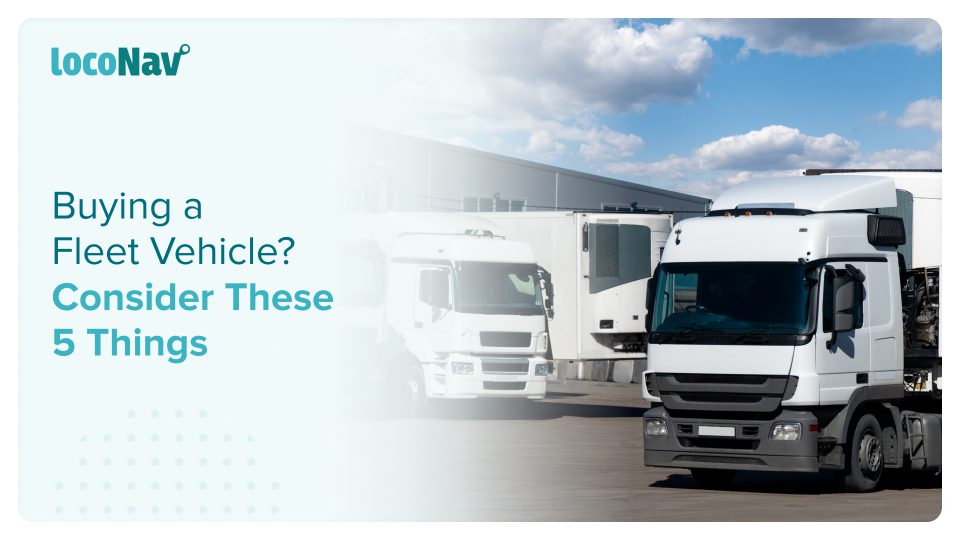

With rapid urbanization and technological advancements, the world is more connected than ever. While the internet is leading this change, fleet vehicles are undoubtedly a close second. To meet the growing demands of eCommerce, the fleet industry has grown exponentially and is expected to grow much faster in the coming years.
Fleet vehicles usually constitute the largest chunk of a fleet’s budget. If you’re a fleet owner or the manager of a business fleet about to do some fleet buying, you won’t have time to sift through all the hype that comes with vehicle shopping. You’ll want to get the greatest vehicle at the best price, whether you’re looking to buy huge delivery trucks, pickup trucks, or service vans, and you probably won’t have time to spend hours sorting through all the sales material.
This blog is meant to help you with this crucial task. Consider the following 5 factors when fleet buying.
What is a Fleet Vehicle?
Fleet vehicles are vehicles that businesses and organisations utilise to provide services or for personal use. These vehicles can provide a variety of services and tasks, ranging from transportation to delivery of goods. Freight, transportation, and moving companies are the most common examples of such businesses.
Service vans, e-bikes, fire trucks, ambulances, pickup trucks, public transport, freight trucks, the list goes on and on.
Manage your fleet efficiently with LocoNav’s Fleet Management Solutions!
What are the Benefits of Fleet Buying for your Business?
Most of the time, the nature of a firm decides whether or not owning a fleet makes sense. Other times, a fleet of vehicles is required to transfer items from one location to another. Furthermore, advertising your business becomes easier and can be influenced by the manufacture and type of fleet.
Here are the major 2 reasons why fleet buying can benefit your business:
- Cost Transparency
Businesses that prefer to own their own fleet have more control over their budget. Because they oversee everything, their costs are more clear. Outsourcing increases dependency, and corporations have no control over how much money is spent on their fleet and where the bulk of it goes.
- Operational Control
You have the most say if you own and manage your own fleet. You may choose your drivers, the vehicles they drive, and when and where they deliver.
Factors You Should Consider When Purchasing Fleet Vehicles
First and foremost, research! The ideal technique is to evaluate all budget-related elements, including capital expenditure, lease choices, practicality, and cost of ownership.
Here are the 5 most important factors to consider while fleet buying:
- Intended Usage
When selecting vehicles, the first thing to examine is their purpose. You must select the appropriate tool for the job. For example, if you intend to tow hefty loads, you will require a vehicle that is large enough. It’s usually a good idea to prioritise the following issues while fleet buying for the best results:
- Vehicle Size and Capacity – vehicle size and capacity must be appropriate for the type and amount of weight that is to be carried.
- Routes – Consider the routes and types of roads that your vehicles will use. Driving off the road in rural areas is not the same as driving on decent metropolitan motorways near cities.
- Distance – Always choose vehicles that can travel the designated distances. Driving a truck overseas on a regular basis is not the same as driving a van in and around town.
- Cargo Type – if you require vehicles to convey people, products, heavy machinery, or liquid substances.
- Budget
After you’ve determined what kind of vehicles you require, it’s time to do the math. The cheapest vehicles may match your budget the best, but they are not always the ideal vehicle for your specific business. For example, cheap vehicles may be inadequate or unsuitable to perform the work you have in mind for them. When fleet buying like this, you will have spent too much money, regardless of the price you got.
- Safety
Making safety a priority while fleet buying has various advantages. Aside from the obvious, it will lower your costs by lowering the frequency of accidents. You will not have to pay expensive insurance premiums if there are fewer incidences. You will also notice a huge reduction in downtime. This, in turn, results in lower repair costs.
- Operational Capabilities
Determine which capabilities and technologies should be included in the new assets. Fleets should think about fuel economy and GPS integration alternatives.
With electric and fuel-efficient vehicle options on the market, businesses should assess whether investing in a fuel-efficient vehicle is good for them and their budget.
Before fleet buying, examine their potential to integrate GPS and telematics devices. GPS and telematics solutions like LocoNav can assist in monitoring driving habits, route planning, traffic updates, and vehicle faults. These can assist a fleet in running more effectively and safely. Companies who want to use these tools should make sure the vehicles they buy have the potential to incorporate the tools.
- Maintenance Needs
Check that the vehicles they buy can be adequately maintained by their workers. While fleet buying, obtaining vehicles with the latest technology may be beneficial for a variety of reasons, if current technicians aren’t trained on how to maintain the vehicle and any expenditures that may be associated with those. If parts are expensive or difficult to obtain, that sort of vehicle may not be a good fit for the fleet.
Tips on Post Purchase Management of Fleet
Here are 5 tips you must consider following post fleet buying:
- Buy vehicle insurance for your newly acquired asset.
- Buy and integrate GPS and telematics devices with your assets.
- Register your vehicle with the proper authorities.
- Enter vehicle details into your fleet management software.
- Affix your vehicle with a FASTag.
FAQ
How Many Vehicles Comprise Of A Fleet?
A fleet can include everything from a collection of service vans, rental cars, and taxi cabs to a collection of bulldozers, backhoes, and skid-steer loaders. A fleet could include anything with a motor that operates on gasoline, diesel, or aviation fuel. Similarly, a fleet can have any number of vehicles –2, 5, 10, 20, 50, 100, or more.
When Should You Buy A Fleet?
When you require complete control over your delivery operations, it is usually a good idea to invest in a fleet.
